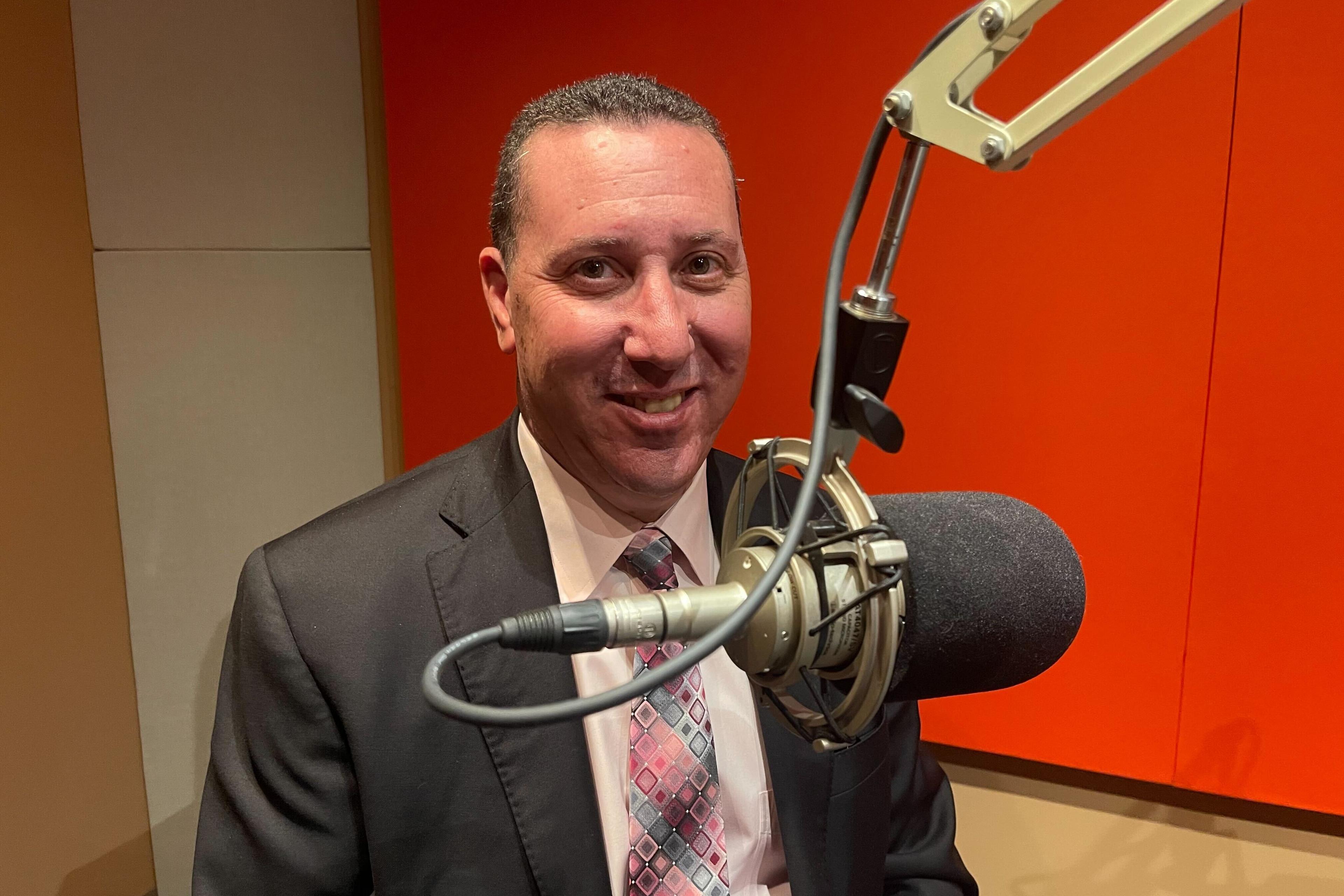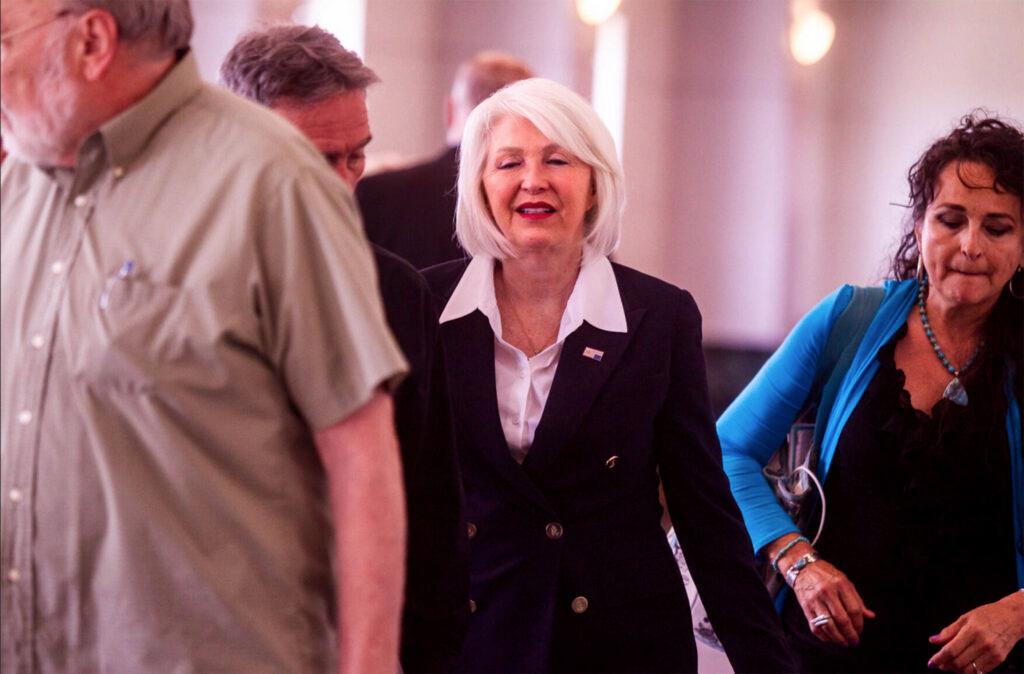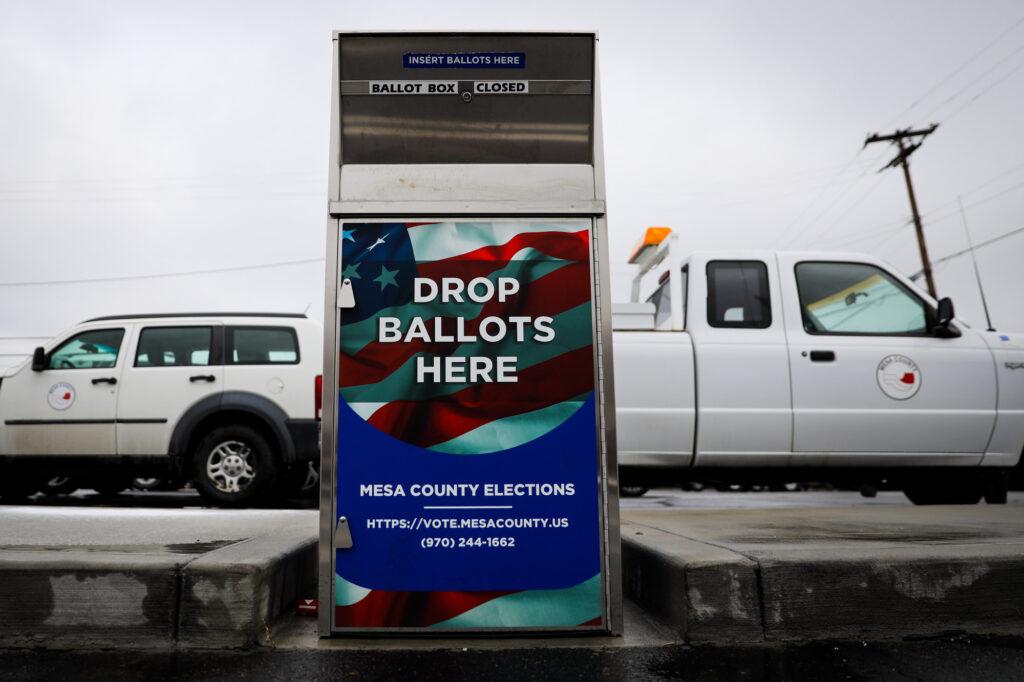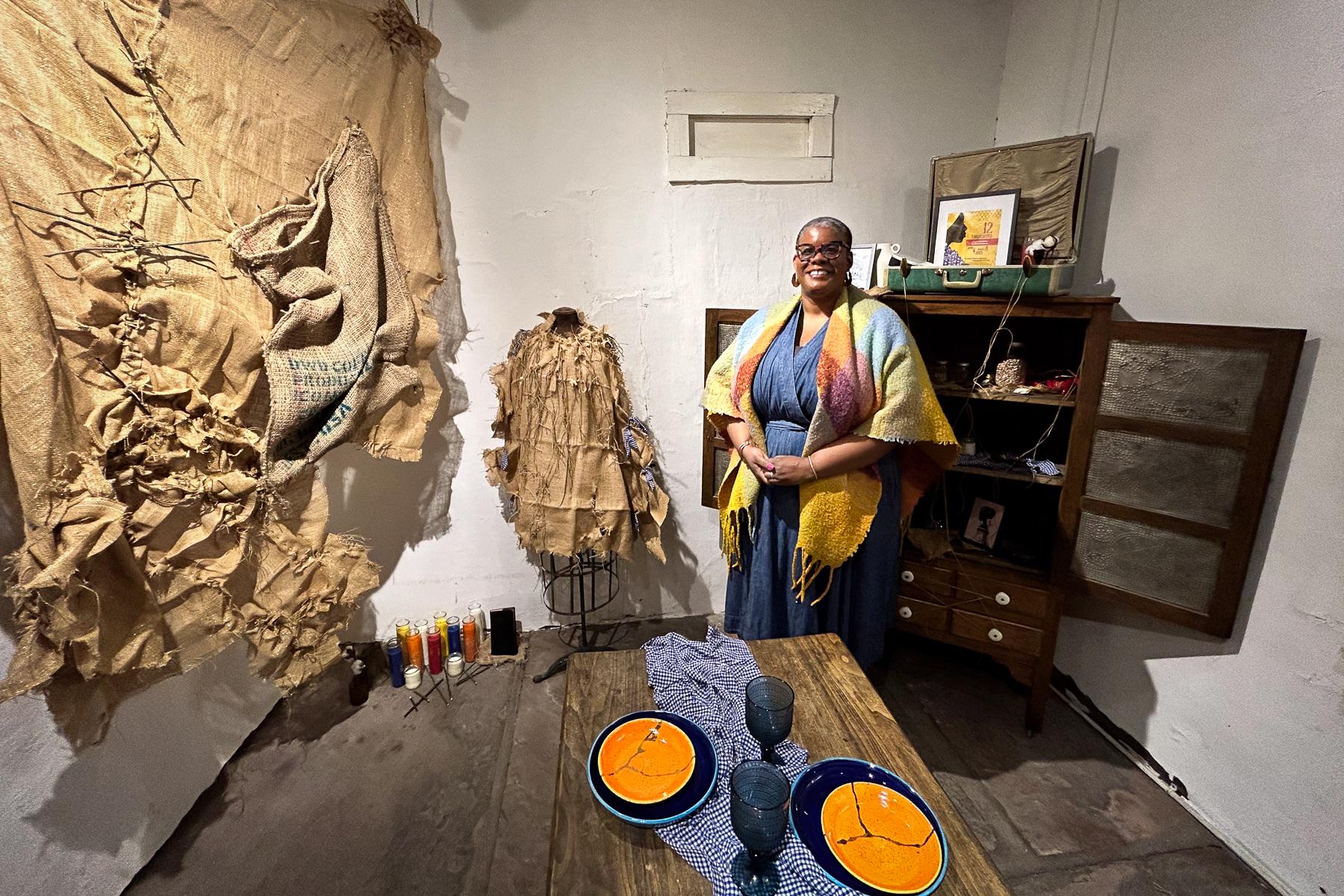
More than three years after the investigation began, former Mesa County Clerk Tina Peters is set to be sentenced next month, having been convicted on charges related to her management of the elections office.
Peters was convicted on seven counts after allowing unauthorized access to Mesa County’s voting equipment. The prosecution of the case took years, with a lengthy investigative process followed by several delays from Peters and her defense team.
Dan Rubinstein, 21st judicial district attorney, said it was a “unique” and time-consuming case.
“She was elected specifically to be the safeguard and then became the threat by sneaking people into the room with machines who weren't supposed to be in there, filming the passwords that she wasn't supposed to have access to, passing them on to other people,” Rubinstein said.
Peters will be sentenced on Oct. 3.
Rubinstein spoke with Colorado Matters host Ryan Warner about the challenges of prosecuting a fellow public official, what he hopes the public takes away from Peters’ conviction and what might be next for others connected to the case.
This interview has been edited for length and clarity
Ryan Warner: Your office had to prosecute a fellow elected official, someone who is a Republican like yourself and on an issue — election conspiracies — that is drawing a lot of attention, still. Is there anything in your career that compares to this?
Rubinstein: I can't say there is. I mean, this was a unique case for us. A lot of people don't know this, but statutorily, the DA's office is charged with investigating election crimes. I started in the office in 1996, I became DA in 2015, and my whole time that I've been practicing law has been in this area, so I've been aware that we handle election crimes. But, most of the election crimes that we handle are, somebody gets their kids' ballot and votes their kids' ballot and their ballot, and we have to decide if we're going to charge that. I mean, it's nothing like this, and certainly at no other point in my career have I prosecuted another locally elected official.
Warner: Now, I'm curious about those. I don't know if I want to call them lower-level examples, but when someone fills out a ballot, do they do so knowingly usually?
Rubinstein: Yeah. The way it works is when you fill out your ballot and you sign for it, there's software that assists in signature verification, and if somebody votes twice or if somebody turns in a ballot and we can tell it's not their signature, we get sent the case. That gets sent to us from the elections office and my investigators will look into it and sometimes we'll end up with situations where somebody filled out and voted more than once and unless we believe they had some criminal intention in doing so, we typically don't charge them, but we will charge it if we know that somebody voted another person's ballot without their permission.
If it was with their permission, for example, let's say my kid's at college and I call him and say, “Hey, your ballot's here” and I say, “How do you want me to fill this out?” I fill it out the way he wants, I sign it for him and turn it in, we won't charge that. We don't think that there's any criminal intent.
But we had one, for example, it was a mother whose daughter's ex-husband's ballot showed up and she didn't like the daughter's ex-husband, and so she voted the way she wanted to vote instead of the way he wanted to vote and turned in her own ballot as well. We charged the felony charge but pled it to a misdemeanor deferred. We figure it probably scared her enough that it won't happen again. So those are the sort of crimes we're seeing typically that are election-type crimes.
Warner: That helps me understand the baseline here in Mesa County and beyond. And so the Tina Peters case, I mean you said “unique.” Is it fair to say, “extraordinary?”
Rubinstein: Yeah. I mean, what was unique about it is she was elected specifically to be the safeguard and then became the threat by sneaking people into the room with machines who weren't supposed to be in there filming the passwords that she wasn't supposed to have access to, passing them on to other people. We ended up learning about this because we found the passwords on the internet. It was actually the Secretary of State's office that found them on the internet and called us and said, “We're coming to conduct an administrative investigation. We don't do criminal. Do you want to have your own investigator there to handle the criminal side of it?”
And that's how we ended up falling into this.

Warner: Did you have much discretion or just based on your mandate you had to say, “Yes, of course we'll take this case?”
Rubinstein: Well, we certainly have discretion on what to charge. We also have discretion on what to investigate, given the fact that our passwords were on the internet and we didn't know why. Obviously we were going to look into that. This happened in August of 2021 — that we learned about it. And, we had an election coming up that November. So we needed to make sure that we locked down the machines and did whatever we needed to do. We didn't know who was responsible at that point, and that's what the investigation was for.
Warner: I gather that any case is about the immediate need to hold someone accountable, but that there is a message that a particular case, verdict, sentence — a message that that can send to the community and to others who might be mulling some similar action. Do you hope this case sends a message and if so, what is it?
Rubinstein: Yes. I do hope that this case sends a message, but before I explain the uniqueness about this case and the message, just think for a minute with me. Typically, in a criminal case, there are a lot of purposes for sentencing, right? There's punishment, there's deterrence. Deterrence can come in two forms: Specific and General. Specific is: we hope this person won't commit another crime if we send a message to them and this will be the response.
Warner: That's right, the immediate message to that person, “Don't do this again.”
Rubinstein: And then of course there's a general deterrence, which is we want the public to see if you do these things, this is what will happen, so don't do them. I don't generally believe that criminals read the newspaper and, like, a drug dealer is not going to read the newspaper and be like, “Oh, wow, look, that drug dealer got eight years for selling drugs. I think I'm going to cancel my plans to sell drugs today.”
However, in this case, I do think that clerks and recorders around the country or people running for clerk and recorder will pay attention. I'm certainly hoping that whatever the outcome is, which is very discretionary with the judge, will send that message.
Warner: To that idea that the deterrence starts with the person who committed the crime, do you get the sense that Tina Peters is contrite?
Rubinstein: Developing respect for the law is a statutory sentencing purpose, and I have not seen anything which would indicate that Ms. Peters has developed any respect for the law based upon what has happened in this case.
Warner: This was a long trial, in part because so much of it happened without the jury present. Tina Peter's defense counsel went on several lengthy monologues on issues that were confusing at times and almost always deemed irrelevant to the trial. Were you worried about the attempts to make this case about election conspiracies instead of the 10 charges that Peters actually faced?
Rubinstein: Our charging decision in this case was very deliberate, and that was to focus on the misrepresentations that Ms. Peters made in order to get people into the room. It didn't really matter whether Dominion Voting Systems are reliable or not reliable or whether the elections were tampered with or not tampered with. It's probably worth noting that (President Donald) Trump overwhelmingly won in Mesa County, so I'm not sure what the belief was that the election was tampered with here in Mesa County, but either way, it's completely irrelevant to whether or not she did what she was supposed to do. In essence, what this case was about, is the checks and balances that our constitution has set up. There are various elected officials that have various roles. Here, the Secretary of State is responsible to oversee elections and to keep the passwords for those machines to make sure that the settings on them stay secure. It's the elected clerk and recorder's job to keep the computers, but she doesn't get the passwords. She only gets the computers. And then it's Dominion's job to have the software and to update the software so that you need to have all three of them in the room together in order to do this.
Warner: That delineation is helpful.
Rubinstein: And that sort of checks and balances is what keeps everything secure. So stealing the passwords and having the person who has access to the computer also have access to the passwords gets rid of our security system. And, really, what we've seen throughout this case is kind of a lack of her acknowledgment that different people have different roles and that the proper way to have gone about this is to go to the county attorney and say, “I think the Secretary of State is misbehaving somehow in deleting election records. Please file something with the district court asking a judge to order that I get to make a copy of this stuff before it gets deleted.”
Warner: Right. It's not like there wasn't a process to air these concerns.
Rubinstein: Right. And that process is the checks and balances of the system, and that's why you have judges who get to enter orders.

Warner: One of the many subplots of this case was around Conan Hayes. He's the retired surfer from California who was given access to voting equipment under false pretenses. At several points, the defense team tried to imply he was a government informant or that Tina Peters thought he was a government informant. What was all that about?
Rubinstein: That really came down to her effort to try to use a defense of entrapment to say that he was a government informant and therefore his pushing her to do this relieves her of criminal liability because the government can't convince somebody to commit a crime and then charge them for that.
There is no evidence that we have found that he's ever been a government informant. We did check with our contacts at the FBI and were prepared to have somebody from the FBI Denver Division who has access to the computer system where they track informants, and they were able to confirm that he was not ever an FBI informant, which was their first claim. And then they tried to offer it to just show that Tina believed (Hayes) was informant, but the judge found that it's irrelevant whether she believed that or not because it wouldn't have justified her doing any of the things that she did.
Warner: Was there any thought of having him testify?
Rubinstein: We were not able to locate him in order to subpoena him to testify, but he would've had a Fifth Amendment privilege as well because he could potentially be charged in this case,
Warner: Possibility of incriminating himself is what you're saying there?
Rubinstein: Yes.
Warner: Can you give us a sense for the cost of this case? I mean, “billable hours” for lack of a better term, Dan. What did it cost the public? And I know that there's also a payoff to upholding the law but these are the actions of a public official drawing on public resources.
Rubinstein: Yeah. The cost I think comes down to two separate concepts. One is the out-of-pocket money that it costs in attorney's fees, for example, not just for my office — obviously the people in my office who worked on the case and their salaries — but we also had to hire outside counsel for quite a few things.
If you trace this back to where this all started, this happened in April and May of 2021, and we learned about it in August of 2021. Fairly shortly thereafter, the county attorney's office had to, on behalf of the county commissioners, file a civil action to remove Ms. Peters as the designated election official. That required outside counsel. The Attorney General was involved, representing the Secretary of State. Ultimately the Secretary of State's office, and the county disagreed on who got to appoint the designated election official, but they both agreed that it shouldn't be Ms. Peters. And so they kind of worked together. While they both thought that they had the right to make the appointments, they decided that cooperatively, working together, to just get somebody in there.
So they ended up getting Sheila Reiner, locally, as well as Wayne Williams, the former Secretary of State. Once that election was over — that was the primary election — they had to then do a general election.
Warner: The expenses are extraordinary.
Rubinstein: So while all this is happening, one of the co-defendants, Belinda Knisley, had been pressuring workers at the county not to cooperate on behalf of Ms. Peters. And so she ended up getting told to leave and that she couldn't be on county property, and she got arrested for burglary for going back to the office and getting on the computer without permission.
So while that parallel case is going on, Ms. Peters ended up recording Judge (Matthew) Barrett with her iPad, and that was brought to his attention. It turned into something that resulted in a contempt action being brought against Ms. Peters for recording him and lying about it. And then when they tried to serve the search warrant, law enforcement — the DA investigators and the police department — tried to serve the search warrant to get her iPad at the bagel shop. She ended up on video trying to kick several officers and ended up getting charged with obstructing government operations. So there was a contempt trial. There was an obstructing government operations trial.
Warner: I mean the tentacles that you're describing of this case …
Rubinstein: Yes, all of this, while we have other people running our elections, I think the cost was about $600,000 that the county had to avoid by signing a new contract with Dominion. Dominion agreed to absorb the $600,000 cost to give us new computers because the Secretary of State de-certified all the computers because we didn't know what she had done to them. So there was a huge financial …
Warner: It's tough math to come up with, Dan.
Rubinstein: Right. And I keep getting asked questions about other people I might want to charge, and I still do have within the statute of limitations, the ability to charge Sherrona Bishop and Conan James Hayes. I'm really hoping that the federal authorities file some charges against them, and I know they have some restrictions with election times, and so hopefully we'll have an answer soon as to whether or not there's going to be federal charges. But I keep getting asked the question, “am I going to pursue more charges?” And I think the cost to this community has been so great as far as all the different things we've gone through: the regular newspaper stories about it, how others around the country view Mesa County.
I mean, this is a fantastic, beautiful, county that has great mountain biking and wine industry and amazing university and all these great things that we want to champion and …
Warner: And presumably safe elections?
Rubinstein: Right? And this is what we're known for. I think it's time to move on.
Warner: This case had a national, international following. I mean, as you've alluded to, it is on an incredibly controversial topic, one with lots of misinformation swirling. Did you ever feel unsafe as the prosecutor?
Rubinstein: Yeah, I mean, there were definitely times where there were more threats than other times. When the case first began, I would sometimes receive two-to-five emails about it a day, and at other times I'd receive 200. So I would assume that somebody was on the Internet saying, “You should email the DA about this,” and my inbox would get flooded.
There were points where some of them were threatening, specifically threatening, and I remember being asked by a friend of mine, “So how many of the emails that you get each day are threatening?”
And I said, “I don't know. I stopped reading them.”
And my friend said, “You stop reading? Well, how do you know if there are threats?”
And I said, “Well, I'm just going to assume there are threats. I don't think it's very good for my psyche to read 200 negative emails a day to figure out which one of them have an actual threat in them.”
So I kind of stopped paying attention, but you could tell which days somebody was out there putting my email address out. Somebody actually doxed me, put my home address and my mother's home address out on the Internet. And then there were times, as we got closer to trial, that there were actually overt death threats that were put out on the Internet.
Warner: Do you forward those to another law enforcement agency?
Rubinstein: I forwarded them on to the FBI
Warner: I noted at the beginning that you are a Republican, and you know this notion that the election was stolen, this false notion has really implanted itself in some parts of the Republican party. I guess I'm just curious what your sense is of the GOP right now and maybe your own Republican identity, given that this rather pernicious story has rooted itself.
Rubinstein: One of the things that came out during the trial from the defense attorneys is that a lot of the things that are going on were because Mike Lindell is getting sued by Dominion.
Warner: The MyPillow guy.
Rubinstein: Yes. And that a lot of these efforts to try to find something to hang their hat on, to show that there was a problem with election security, is really about him getting out of his defamation case because truth is a defense to defamation.
So a lot of these myths about election security have been perpetuated for somebody to get out of a civil suit.
Warner: Wow.
Rubinstein: But as far as it relates to my identity, I'm the sort of Republican that believes that you respect law enforcement. You don't kick at cops, you follow the law. And if the law says you don't lie to people to manipulate their decisions, then that's a crime. And if you go about things the right way. The law is to be respected, which means you go to court and you ask a judge to intervene and do something. So I have no qualms about taking this case and charging another fellow Republican. We are all held to the same standard, and certainly elected officials should be held not just to the same standard, but to a higher standard, and we're supposed to be setting the example of how to behave.

Warner: What do you think about the safety of election workers, election volunteers for this coming election, and how much did that play into the timing of this and your thought about prosecuting the case?
Rubinstein: The timing of this case really had nothing to do with elections. It took us a long time to get through the digital devices. There was something called a filter process where we had to have a filter team go through the cell phones and the iPads and make sure that there was not privileged attorney-client communication that was turned over to us. And ultimately, once we were able to get the case moving, it took about a year and a half. Ms. Peters went through several attorneys, and so it was just trying to get the case to trial as quickly as possible.
All in all, it took more than three years from the time we learned about it before we actually got to trial, and we still haven't even gotten to sentencing. It just happens to be, the sentencing is October 3 and right about a month before the general election. So that's all coincidence.
I'm not terribly worried about the election workers' security with this upcoming election. What has become clear to me is that Ms. Peters does not have much of a local following. Despite there having been some threats to me and others on my team put out on the Internet, when I was doing the trial, the people sitting on Ms. Peters’ side of the courtroom were perfectly respectful. They would hold the door open for me. They would say “Good morning.” I mean, there's nothing about them that I thought was a security threat. They appeared to be people who just genuinely cared about Ms. Peters and were there to support her. They didn't really react much when the verdict came in. I don't think they were surprised at what the verdict was going to be. I think they were just there to support her, and I certainly did not get the impression that they were any sort of a threat.
Warner: You don't get the sense that this election will be any sort of hotspot in Mesa County?
Rubinstein: No, I don't.
Warner: Cooler heads are prevailing, perhaps.
Rubinstein: Yes. And certainly even within our local Republican party, I feel like the support is very much more on my side than Ms. Peter's side of this.
Warner: Do you think that you've got to pay attention to this case on an appellate level? Do you expect appeals?
Rubinstein: Beyond the discussion that I already had with you about all the tentacles that were going on with this case, one of the things that's happened is Ms. Peter's attorneys actually filed an action in federal court asking the federal court to stop me from the ability to prosecute her. They, of course, lost, and then it went up to the 10th Circuit Court of Appeals. They lost there as well. And then they petitioned to the United States Supreme Court just before the trial and lost there as well.
Warner: On what grounds could they possibly remove you?
Rubinstein: Largely, they were claiming Supremacy Clause. They were claiming that federal law requires that Ms. Peters protect election records and that she was required to do this in order to protect election records under the Supremacy Clause and that federal law trumps state law.
They of course lost that because none of the things that Ms. Peters did were necessary to protect election records. There was nothing that requires that you lie to the Secretary of State to protect election records.
In fact, the thing that was so silly about their defense, to be quite honest, is that most of the things that she was convicted of happened on Tuesday, May 25th. She had already made an image of the computer on Sunday May 23rd. So at the time that she was committing these crimes, she had already made an image of the computer. So all the claims that she had that she was doing this to protect election records, that was already done with.
In any event, yeah, I expect the case will get appealed, but all criminal trials get appealed. I think the judge did a really nice job of giving them leeway. He cut them off when he needed to cut them off, but they continued to disregard his orders and continued to talk about things they weren't supposed to talk about. But when it comes down to it, one of the things that the Court of Appeals looks at is whether or not something is harmless error, whether or not, but for that error, the outcome would've been different, and the evidence here was overwhelming. I mean, she wasn't even really claiming that she didn't do it. She was just claiming that she was justified in doing it.
Warner: Am I right that this is the only conviction to come out of “the big lie?” If you're not talking about January 6th.
Rubinstein: I believe our case, my case is the only one that has gone to trial. There are other people that are charged with doing similar things in other jurisdictions that have not gotten as far as my case has.
Warner: Before we go, is there something you want people to understand about this case that maybe they miss?
Rubinstein: What I would like is for everybody to understand that there is nothing political about this case to me. To me, this is simply: an elected official broke the law, and an elected official is being held accountable for breaking the law. Obviously, I'm not looking to charge people in my own party. I'm also not looking to charge people in the other party. That's not what public safety is all about. And if you are having politics enter into your thought process in really any of the public safety elected positions, you're doing it wrong. If you are having politics enter into your job as sheriff or your job as coroner or your job as district attorney, you are not equally applying the law.








